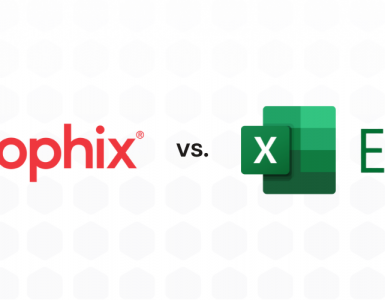Artificial intelligence is no longer the “next big thing” for finance — it’s the current big thing. According to a CNBC survey, 69.2% of CFOs say AI is either critically important or very important to their business. Only 2.6% said it was “not at all important.”
AI can help CFOs and the office of finance automate repetitive, time-consuming tasks. It can also provide the data consolidation and analytics power CFOs need to make more accurate risk assessments and predictions. In other words, AI can help CFOs get more work done today, and get a clearer picture of the future.
The value proposition is clear. But there are still challenges to adopting AI in finance — most of them on the human side of the equation. There’s understandable hesitation, fear of change, the need to build new skill sets within the organization. The whole process can seem daunting.

To help CFOs make sense of this new landscape, we’re asking experts on AI in finance to help out. For this interview, we tapped David Talby, CTO at Pacific AI. Read on for David’s thoughts on AI, machine learning, and the expanding data purview of the office of finance.
Prophix: What do you think is the ideal relationship between Artificial Intelligence and the Office of Finance?
David: Well, AI is a technology, right, it’s not its own function or its own thing. So, like any technology, the goal is to find out how you can actually help and improve the work that the CFOs are doing. Whether it’s in terms of revenue optimization, cost control, or compliance. Really in every area, you can get smarter by being able to automate more, to do things earlier, detect things earlier and basically enable CFOs to deal with a greater complexity of business.
So really the right way to do it is like any sort of project: Look at something that’s available, make sure it’s a business priority, actually make it happen, and have both sides learn as you do the project.
[bctt tweet=”You get smarter by being able to automate more, do things earlier, detect things earlier, and enable CFOs to deal with a greater complexity of business.” username=”davidtalby”]Prophix: So you would say AI will primarily help to streamline operations?
David: Exactly. Look, every technology removes constraints that you had before. So, before there were things that you had to do manually or you just could not do or you could not do at scale, now the constraint is no longer there. What CFOs need to do is say, “Okay. If this constraint did not exist, what would I be able to do?”
So, for example, if I could look at every payment, every transaction and I did not need to do end-of-month reconciliations or end-of-month fraud detection or recommendations on the best suppliers to choose, and I could just do it in real time at the business center, what would that look like? And then, we just go and build it.
[bctt tweet=”Every technology removes constraints that you had before. CFOs need to say, ‘If this constraint did not exist, what would I be able to do?’…then go ahead and build it.” username=”davidtalby”]Prophix: In what ways do you see AI having a positive disruptive effect in finance?
David: Well, I think there are two main areas. One is operating the business in terms of making financial cost optimization, revenue optimization decisions in terms of choosing suppliers, doing dynamic and automated pricing, looking at where you compete, who do you want your suppliers to be, all of those areas. These are things that you do manually today. You can make it much more data-driven than today. That’s one area.
The second area is in the compliance space. So, I’ve personally done a lot of work on fraud detection in finance. You can look at anything from finding rogue traders to looking at compliance relations within your organization, especially when you go beyond the textbook rules and you’re trying to identify new schemes that people are trying to put together. I think that’s one area where data science, abnormality detection, machine learning can do a lot in terms of uncovering those issues faster and being able to implement faster.
Prophix: Are there specific applications of AI that you think will be implemented within the Office of Finance in the near future?
David: Yes, and I think things are already happening. Many of the basic decisions involved in running the business are already being automated: Decisions in terms of how much inventory to buy, how much to pay for it, where to send it, where to market, how to price, those things. If you look at retail, at sales, at the financial services industry, at the advertising industry, those are things that have already been automated.
And where you used to use Excel and upload data and maybe look at it once a week, or once a month, or once a quarter, now we have these real-time dynamic pricing applications that are working and absolutely changing revenue matching for companies. And we see those implemented anywhere from cybersecurity applications to online gaming to cell phone marketing.
The other is fraud prevention. Especially with the industries that sell fast like auto trading, online gaming, advertising. So, online advertising, real-time ad buying, and those markets, where we are doing things at the nanosecond level, just humans are not able to respond. So those are the places where the impact is so material that people are making the investment to put those systems in place and then really have the competitive advantage.
Prophix: In what ways will AI be customer facing?
David: Well, if you look at our experience on sites like Amazon or Facebook and Google, those are definitely consumer-facing applications. So, if you look at Amazon as a retailer, actually all the core functions of a retailer — merchandising, what inventory do I show you, what do I highlight, what do I market, pricing, how much does it cost, and showing different pricing to different people — All of those are determined algorithmically. And this enables you, first of all, to work on a much bigger scale but most importantly you can actually personalize, you can look at individual items.
So, what used to be in retail where, “Oh, I’m a buyer. I’m buying two items. I’m going to buy the entire collection of this Italian designer, I put in the address, and basically, the price which I negotiate 5% off for everything.” Now I can actually set price in real-time item by item for the customer based on what they think is selling best, my inventory level, what people seem to like, I mean all of this is actually happening.
Prophix: What do you wish people in finance knew about AI?
David: Well, it’s a very large industry, right? The financial industry includes people from the most sophisticated Algo-traders to people who focus on accounting and basic tax questions and reconciliation. So, you have a very large distribution in terms of knowledge and sophistication. I guess what I would want people to know is that the technology is here. So, there’s a lot of futuristic AI and it makes for compelling news stories. But in terms of actually running your business better, being able to do real-time pricing, being able to do trading automatically, being able to find rogue suppliers, supplies you are not delivering automatically, those are solutions that are here, they are ready. The technology is proven, they are in production in quite a few places. We’re moving from the innovator to the early adopter stage. Right now there’s the ability for you to go and implement one of those systems with much lower risk than people perceive in terms of the rates of success.
Prophix: How can finance professionals can begin experimenting with AI today?
David: It’s really the same as with any technology. Look at what’s painful in your current business, seek just one area, one project where you can actually put the system to the test. Something that, if it works, will make a positive difference to your business. Start with that project, fund it. You will learn a whole lot about technology, technology will learn a whole lot about you and that’s usually where you start and where you scale from.
David Talby is a consulting CTO specializing in AI. You can find him on LinkedIn and Twitter.
For more expert advice on AI in finance, check out Activating Imagination: Artificial Intelligence and Machine Learning in Finance.






